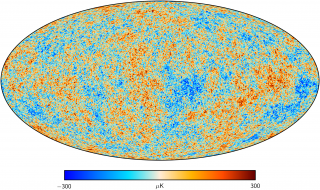Bibcode
Rubiño-Martín, J. A.; Chluba, J.; Fendt, W. A.; Wandelt, B. D.
Bibliographical reference
Monthly Notices of the Royal Astronomical Society, Volume 403, Issue 1, pp. 439-452.
Advertised on:
3
2010
Citations
68
Refereed citations
65
Description
We use our most recent training set for the RICO code to estimate the
impact of recombination uncertainties on the posterior probability
distributions which will be obtained from future cosmic microwave
background experiments, and in particular the Planck satellite. Using a
Monte Carlo Markov Chain (MCMC) analysis to sample the posterior
distribution of the cosmological parameters, we find that Planck will
have biases of -0.7, -0.3 and -0.4σ for
nS,Ωbh2 and
log(1010AS), respectively, in the minimal
six-parameter Λ cold dark matter model, if the description of the
recombination history given by RICO is not used. The remaining
parameters (e.g. τ or Ωdmh2) are not
significantly affected. We also show that the cosmology dependence of
the corrections to the recombination history modelled with RICO has a
negligible impact on the posterior distributions obtained for the case
of the Planck satellite. In practice, this implies that the inclusion of
additional corrections to existing recombination codes can be achieved
using simple cosmology-independent `fudge functions'.
Finally, we also investigated the impact of some recent improvements in
the treatment of hydrogen recombination which are still not included in
the current version of our training set for RICO, by assuming that the
cosmology dependence of those corrections can be neglected. In summary,
with our current understanding of the complete recombination process,
the expected biases in the cosmological parameters inferred from Planck
might be as large as -2.3, -1.7 and -1σ for nS,
Ωbh2 and log(1010AS),
respectively, if all those corrections are not taken into account. We
note that although the list of physical processes that could be of
importance for Planck seems to be nearly complete, still some effort has
to be put into the validation of the results obtained by the different
groups.
The new RICO training set as well as the fudge functions used for this
paper are publicly available on the RICO webpage.
Related projects

Anisotropy of the Cosmic Microwave Background
The general goal of this project is to determine and characterize the spatial and spectral variations in the temperature and polarisation of the Cosmic Microwave Background in angular scales from several arcminutes to several degrees. The primordial matter density fluctuations which originated the structure in the matter distribution of the present
Rafael
Rebolo López